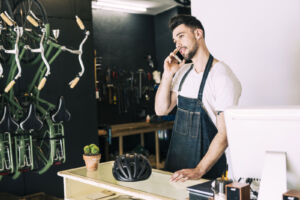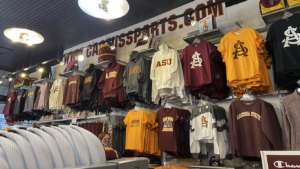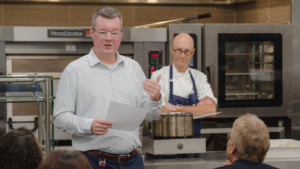Today, people generally recognize the importance of shopping locally and supporting our region’s independently owned and operated businesses. But that wasn’t always the case. As recently as seven years ago, the concept was nearly unheard of in Arizona. But in 2003, Kimber Lanning, of the independently owned and operated Stinkweeds music store, started Local First Arizona, then called Arizona Chain Reaction, in an effort to bring the community together and support each other.
“People weren’t really connecting,” says Lanning, who lives in and loves the Phoenix area.
That love of Phoenix compelled her to start a crusade for local, independent store owners. That crusade turned into Local First Arizona, a statewide organization aimed at helping to strengthen local communities in Arizona, bring them together and encourage them to support one another. And she did it one person at a time.
“I just started knocking on doors,” Lanning says of her start-up approach to educating local residents about the importance of celebrating the uniqueness of independently owned businesses in their very own neighborhoods versus the chain stores.
In 2006, she applied for 501(c)3 nonprofit status and changed the name from Arizona Chain Reaction to Local First Arizona to better reflect the goal and mission of the organization — to help people understand the benefits of buying locally and to build a better sense of community.
“I think neighborhoods are finally realizing how important it is (to buy locally),” she says. “It’s like it finally just dawned on us that we can create diverse and unique cities … we can control this.”
It is part of Local First’s mission to educate people on the facts about the real benefits of shopping locally. Studies show that for every $100 spent in a locally owned business, approximately $42 stays in the state. If that same $100 is spent in a chain store, just $13 of it stays right here.
In 2008, Lanning created the Small Wonders maps, pocket-sized guides — one each for Phoenix, Tempe and Scottsdale — that list unique shopping and dining destinations in the three defined areas. Lanning printed 75,000 copies of the Phoenix version, and downloadable versions of the maps also are available at www.localfirstaz.com. She says the buzz around the maps has been incredible.
“They’ve really taken off,” Lanning says. “Now is the best time to promote independent businesses.”
Indeed that remains one of Lanning’s biggest challenges, managing the rapid (“almost too rapid”) growth of her concept, along with securing funding. But she hasn’t let the latter stop her.
“With any new concept, it’s difficult to secure funding,” she says. “So I’m running it like an entrepreneur would, rather than relying on grants.”
Local First currently has 1,800 members, but Lanning has high hopes for the future.
“As I’ve gotten more involved, I’ve realized things we need,” she says.
She hopes to develop awareness for the adaptive reuse of existing buildings to ensure sustainability, increase business-to-business support, grow membership to 5,000, and develop a diversified staff that can offer programs, benefits and support for the state’s locally owned businesses.
Lanning, whose very own personal business, Stinkweeds, resides in the Central Corridor, is thrilled as she talks about the recent growth and development in the Downtown area.
“I am overjoyed to watch the city growing into itself,” she says. “It’s phenomenal. I feel like I’m in the right place at the right time.”
But Doug MacKenzie, director of communications at the Greater Phoenix Convention and Visitors Bureau, thinks it’s more than just a little luck. He credits Local First and Lanning with driving the unique farm-to-table food product and for helping Phoenix become a culinary destination in its own right — complete with amazing farmer’s markets and unique events. One such event was the recent Devoured Culinary Classic at the Phoenix Art Museum, which Local First spearheaded and co-sponsored.
MacKenzie says that due to efforts by Local First, locals and visitors to the Phoenix area have the opportunity to “really experience the authentic and native foods of the region and the Southwest. Local First is great for promoting our culinary scene.”
More than just promoting local dining establishments, Local First also seeks to bring together communities, neighborhoods and people — one door at a time.
www.localfirstaz.com



